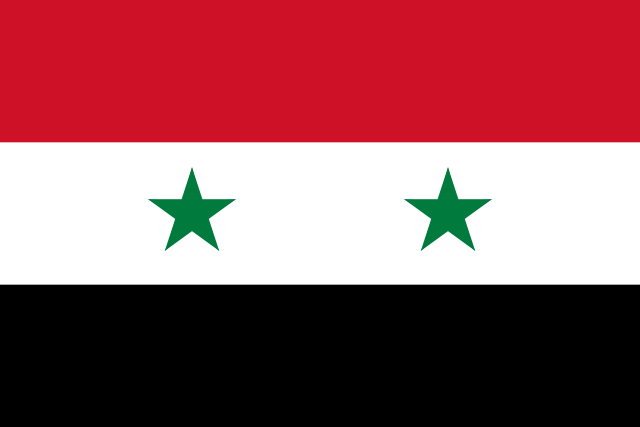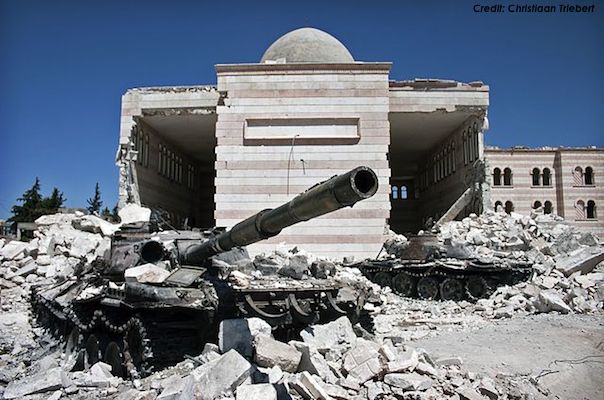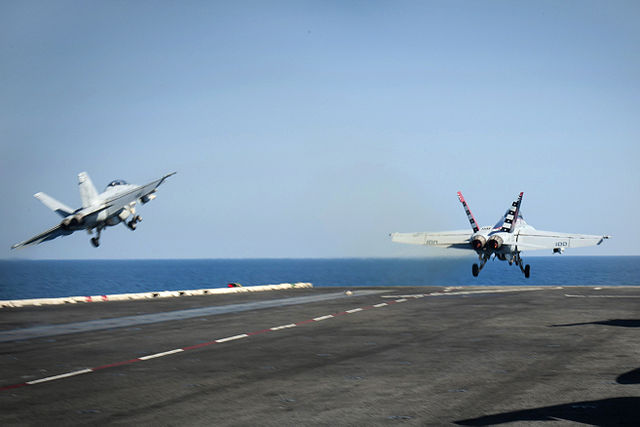The Syrian Civil War may still have a long hard slog ahead of it, but the Syrian Revolution is definitely over and the “moderate fighters” are now commanded by the religious extremists (not “moderate civilian leaders”), according to new reporting by The New York Times:
In northern and eastern Syria, where Mr. Assad’s opponents won early victories and once dreamed of building self-government, the nationalist rebel groups calling themselves the Free Syrian Army are forced to operate under the extremists’ umbrellas, to go underground or to flee, according to Syrian insurgents, activists and two top commanders of the American-financed F.S.A. groups.
The recent Nusra Front victory at the besieged Syrian military base at Wadi al-Deif — which had held out against rebels for two years on the primary north-south artery in Western Syria — seemed to crystallize the entire situation in one place, according to the Times sources:
The fall of the army base at Wadi al-Deif, which straddles an important supply route in Idlib Province, proved the Nusra Front’s dominance, they said. Other insurgents had long besieged the base without victory. Nusra succeeded after seizing much of the province from Harakat Hazm and the Syrian Revolutionaries Front, two of several groups that until recently, American officials were calling the opposition’s new hope.
Back in November I noted a story about Nusra Front crushing the CIA-backed Harakat Hazm rebel group and stealing their weapons, which was believed to include some pretty heavy hardware. That seems to have played a role in the Nusra Front victory at Wadi al-Deif:
Those groups had received sophisticated American-made TOW antitank missiles, and their commanders expected to act as the ground force in the American-led campaign against ISIS. But lately they say the flow of American aid has dwindled as Washington’s strategy shifts to building a new force from scratch.
How exactly the Wadi al-Deif battle unfolded remains murky, with different commanders giving different versions. But reports and images from the operation make two things clear: antitank missiles were used, and Nusra claimed the victory. That means that the American-backed fighters could advance only by working with the Nusra Front, which the United States government lists as a terrorist group, or that they have lost the weapons to the Nusra fighters, effectively joined the group or been forced to follow its orders.
One commander of a group that received antitank missiles said that some F.S.A. fighters were forced to operate them in the battle on behalf of the Nusra Front, which had captured them from American-backed groups — a turn of events that he worried would lead the United States to cut off support.
Earlier this month I was also reading a whole bunch of articles about how miserable life under the Syrian rebels is (in stark contrast with how normal things have returned to under regime-held areas). Based on those reports, the rebels spend most of their time attacking each other, looting their own occupied zones down to the studs, profiteering from the populace, and generally causing mayhem and misery. In some communities, such as Douma, residents are openly staging protests against the rebel authorities and counting down the days until “liberation” by the government they once opposed.
Maybe I’m biased in favor of seeing what I want to see (because I’ve been opposed to intervention and as opposed to the rebels as the regime for 2.5 years now) or maybe I’m just reading slanted sources. But the more I keep reading about what’s going on in Western Syria, the more open I am to considering that the regime might actually be the real lesser-of-two-evils at this point, even if they didn’t start out that way.
Is the regime criminal and horrific? Yes absolutely. But probably not more so than the rebels, who at this point are the ones really dragging out the misery for civilians, through direct cruelty and indirectly by refusing to concede a severely lost cause. Did the regime wildly mishandle the first year-plus of the war, to everyone’s detriment and pain? Agreed. Is the regime viscously sectarian, as critics still maintain? Yes, but so are the opponents.
Read more







